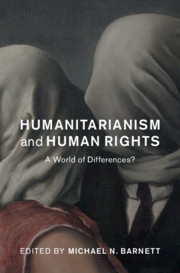Book contents
- Humanitarianism and Human Rights
- Human Rights in History
- Humanitarianism and Human Rights
- Copyright page
- Contents
- Contributors
- Acknowledgments
- Introduction
- Part I Differences or Distinctions?
- Part II Practices
- 5 Humanitarian Governance and the Circumvention of Revolutionary Human Rights in the British Empire
- 6 Humanitarian Intervention as an Entangled History of Humanitarianism and Human Rights
- 7 Mobilizing Emotions: Shame, Victimhood, and Agency
- 8 At Odds?
- 9 Innocence
- 10 Reckoning with Time
- 11 Between the Border and a Hard Place
- Conclusion
- Notes
- Bibliography
- Index
11 - Between the Border and a Hard Place
Negotiating Protection and Humanitarian Aid after the Genocide in Cambodia, 1979–1999
from Part II - Practices
Published online by Cambridge University Press: 19 October 2020
- Humanitarianism and Human Rights
- Human Rights in History
- Humanitarianism and Human Rights
- Copyright page
- Contents
- Contributors
- Acknowledgments
- Introduction
- Part I Differences or Distinctions?
- Part II Practices
- 5 Humanitarian Governance and the Circumvention of Revolutionary Human Rights in the British Empire
- 6 Humanitarian Intervention as an Entangled History of Humanitarianism and Human Rights
- 7 Mobilizing Emotions: Shame, Victimhood, and Agency
- 8 At Odds?
- 9 Innocence
- 10 Reckoning with Time
- 11 Between the Border and a Hard Place
- Conclusion
- Notes
- Bibliography
- Index
Summary
This chapter examines how aid workers who arrived in Cambodia to manage the refugee camps after the genocide ended up becoming more deeply involved in the politcs of peace negotations and postconflict reconstruction, which led them into development and into a supporting position vis-à-vis Hun Sen, the new leader of Cambodia who had been accused of genocide.
Keywords
- Type
- Chapter
- Information
- Humanitarianism and Human RightsA World of Differences?, pp. 219 - 234Publisher: Cambridge University PressPrint publication year: 2020

